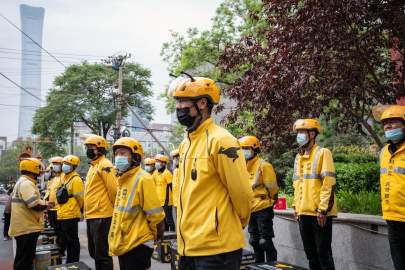China Beefs Up Antimonopoly Body Amid Regulatory Push

HONG KONG—China’s antitrust watchdog is beefing up its senior ranks as authorities step up efforts to rein in the country’s powerful technology companies.
Dong Hongxia will take on a new role as a third deputy director-general of the Antimonopoly Bureau, part of the powerful State Administration for Market Regulation, according to people familiar with the matter. Ms. Dong, currently director of a division responsible for reviewing mergers, is an expert on antitrust issues and a frequent speaker at seminars and events.
The appointment, expected to take effect in the coming months, would mark the first time that the bureau has three deputy director-generals at once—a reflection of the agency’s growing clout, the people said.
Several low-to-mid-level officials will be added to the bureau’s merger-review divisions as it expands its reach and resources in the widening antitrust crackdown, these people said.
The market regulator didn’t respond to a faxed request for comment.
China has been tightening the screws on its homegrown internet giants since late last year. The market regulator earlier in April slapped a record $2.8 billion fine on Alibaba Group Holding Ltd. for anticompetitive behavior after a monthslong investigation.
On Monday, the agency launched a probe into delivery giant Meituan. It has also meted out smaller fines to dozens of companies for failing to seek clearance on past deals.
One of the central targets in beefing up the Antimonopoly Bureau is Chinese technology companies registered in offshore tax havens, who for years were able to pursue mergers and acquisitions with little to no regulatory oversight.
Chinese tech companies have used the structure, known as a variable interest entity, to receive funding from foreign investors, though the legality of antitrust regulations on such companies was unclear under Chinese law.
Late last year, authorities moved to end the ambiguity, requiring offshore-registered companies to seek antimonopoly clearance for any such deals. At the same time, the Antimonopoly Bureau began turning its attention to retroactive enforcement actions.
The bureau is now sitting on a backlog of roughly 1,700 cases in which companies have been suspected of failing to file for regulatory review, according to the people familiar with the new appointments.
The practice, known as “gun-jumping” in U.S. and European jurisdictions, is a punishable offense under Chinese law, though it triggers only a modest fine of up to 500,000 yuan, roughly equivalent to $77,000, if the merger isn’t deemed to have resulted in a monopoly.
However, Chinese regulators can levy harsher penalties—including a forced unwinding of the deal—if a merger or acquisition is deemed to harm competition.
On Friday, the market regulator said it was imposing penalties for nine additional gun-jumping cases, covering deals made by several companies including Tencent Holdings Ltd. , ride-hailing company Didi Chuxing Technology Co., retailer Suning Holdings Group and Ant Group Co. Each was fined the maximum 500,000 yuan.
The heavy caseload, the people said, has driven the need for more personnel and resources to be added to the bureau, which has seen its profile rise quickly in recent months.
“This new top-down law enforcement campaign is a huge boost to this small bureau,” said Angela Zhang, a law professor at the University of Hong Kong.
The market regulator is planning to expand the number of employees focused on antitrust by another 20 to 30 people, up from about 40 now, Reuters reported earlier in April.
In the past decade, many offshore-registered Chinese internet companies grew quickly by snapping up stakes in smaller rivals or acquiring them outright. Such behavior went virtually unchecked by regulators amid the legal ambiguity.
Tencent has been perhaps the best example of this. Over the years, it became an investment powerhouse, buying stakes in hundreds of startups and sending the market value of its portfolio to roughly a quarter of a trillion dollars at one point.
The State Administration for Market Regulation was established in March 2018, during a broad reshuffle of central government agencies. It absorbed several other agencies and was given a comprehensive mandate that spans from business registration to food and drug safety.
During the overhaul, authorities established the Antimonopoly Bureau, consolidating anticompetition functions that previously resided in the Ministry of Commerce and in the National Development and Reform Commission, the state’s main economic planner.
Photo: Couriers for Meituan, a delivery company facing a regulatory probe, took part in a briefing in Beijing last week.
PHOTO: YAN CONG/BLOOMBERG NEWS
Link: https://www.wsj.com/articles/china-beefs-up-antimonopoly-body-amid-regulatory-push-11619791132




